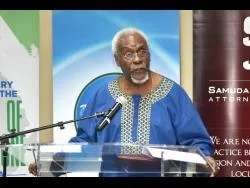
I have been following the reparations discussions and have written at least one article in this column addressing the subject. I am wading in again.
There is a report in the Loop News of July 31, 2023 titled ‘The Repair Campaign, founded by Denis O’Brien, picks up steam’. In this article, Mr O’Brien, former chief executive officer of Digicel and initiator of the reparations ‘Repair Campaign’, is reported as saying that he has been coming to the Caribbean for 25 years and heard from politicians that after independence, they had to fend for themselves without support from their colonial masters. Mr O’Brien’s statement would need clarification as to the substance of his discussions with Caribbean leaders.
Documentary evidence shows that the CARICOM member states have been receiving development assistance from their former European colonising countries, both bilaterally and from the regional level. These countries are primarily Britain, France, The Netherlands, and Spain. Up to 2020, they were all members of the now European Union (EU). Britain has since withdrawn.
The CARICOM countries, as members of the African, Caribbean and Pacific (ACP) Group of States, now the Organization of African, Caribbean and Pacific States (OACPS), from 1975, as signatories of the binding Lomé Conventions and the Cotonou Partnership Agreement, received development funding through the European Development Fund (EDF). The EDF was established in 1957 under the Treaty of Rome, establishing the European Economic Community (EEC), specifically to provide development assistance to colonies and former colonies of its member states.
Since 1975, an estimated €113 billion has been provided to the ACP States through the EDF. My rough estimate is that about €10 billion was provided to CARICOM countries at the national and regional levels. The EU is the most significant grant donor to CARICOM. Regrettably, it was not possible to get from regional sources the exact figures for development aid to the CARICOM region from the EU and bilaterally from the European countries involved since independence.
Inadequate and ineffective
I can understand Caribbean politicians saying that from their analysis, development aid given by former European colonisers, including the EU, has been inadequate and ineffective. This is assuming that the analysis has been done at the national and regional levels. But I cannot understand politicians conveying to Mr O’Brien the impression that they got nothing and were left to fend for themselves, when the available documentary evidence says otherwise. There must be a place for facts in all discussions.
In 1973, Britain joined the EEC along with Ireland and Denmark. The EEC membership was then nine – Belgium, Netherlands, France, West Germany, Italy, Luxembourg, Britain, Ireland, and Denmark. The majority of these were former colonial powers and were involved in the transatlantic slave economy.
In joining the EEC, Britain took with it its cortége of Commonwealth independent countries of Africa, the Caribbean and the Pacific (ACP). These countries joined with former colonies of France and Belgium already benefiting from the EDF through specific agreements. It was decided that the EEC would negotiate a new trade and development agreement with these former colonies of its member states. The ACP countries then numbered 46. It is not clear whether in the lead-up to the start of the negotiations, the issue of the impact of colonisation and slavery on these countries was ever discussed.
The negotiations lasted for 18 months from 1973 through to 1975. The Caribbean played a leading role. By this time, CARICOM had been formed in July 1973 and these negotiations were an influencing factor. Percival James (P.J.) Patterson, minister of industry, trade and tourism, was a lead negotiator for the ACP group. In fact, he hosted a joint ACP/EEC negotiating session in Jamaica in July 1974.
In February 1975, the concluded trade and development agreement was signed at a ceremony in Lomé, the capital of Togo in West Africa. This now Lomé Convention was hailed as revolutionary in North/South relations. A 1975 Gleaner report called it a “Scintillating Success”.
In his book, ‘My Political Journey’, former Prime Minister P.J. Patterson, on page 78, states, “No one can claim that the ACP Group secured all that it sought, but no one can deny that the Lomé agreement broke new ground and at the time was expected to serve as a template for fair and mutually beneficial partnership between the developed and developing world. It was a solid foundation on which to build.”
Among other things, this agreement provided duty-free non-reciprocal access to the EEC markets for commodities and other products produced in and exported by ACP countries; a stabilisation fund for fluctuating commodity prices; and development assistance through the EDF.
The ACP was formalised as an alliance when the Georgetown Agreement was signed at an ACP Ministerial Conference in Guyana in June 1975.
This first Lomé Convention lasted until 1980. Thereafter, three other agreements were concluded. In 2000, the Lomé agreements were replaced by the Cotonou Partnership Agreement to last until 2020.
REPARATIONS AND DEVELOPMENT ASSISTANCE
When asking whether there is a link between reparation claims and development assistance, I was told there is none. It muddies the waters. At the same time, I am reading articles proposing that reparation payments should be treated like overseas development assistance and should be used to finance national development projects. Mr Denis O’Brien has proposed using his considerable influence in Europe to have the former colonising countries establish a development fund for reparatory justice.
Justice Patrick Robinson has also spoken of establishing a development fund. In 2021, a UN Special Rapporteur told the UN General Assembly that reparations must be about the victims, it cannot be disguised as development assistance. But, for us, who are the victims?
I do believe that the advocates of reparations need to take a comprehensive approach and examine development assistance through the years to determine whether, in fact, there is any link between development assistance, provided bilaterally by the former colonising countries and through the EU, and reparation claims.
I support the view that discussions on reparations need to be rational, pragmatic, comprehensive, and properly coordinated with other government ministries, departments, and agencies.
Indeed, reparations for historical harm is a very complex matter.
Elizabeth Morgan is a specialist in international trade policy and international politics. Email feedback to columns@gleanerjm.com


